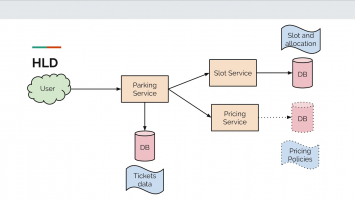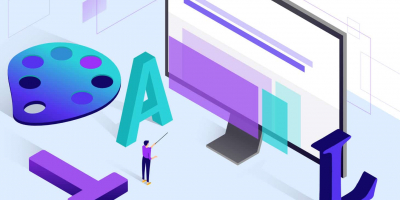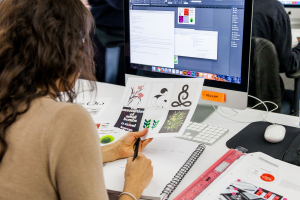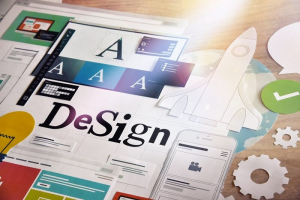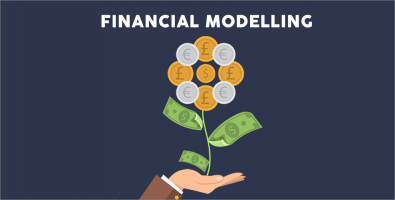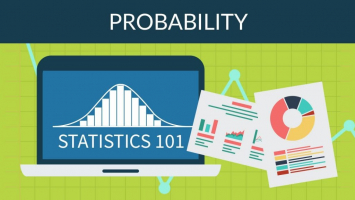Top 9 Best Online Experimental Design Courses
Are you wondering which remote classroom to attend? You have spare time and want to broaden your horizon about a specific field of study whilst just staying at ... read more...home. Thus, to satisfy the burgeoning demand for online yet qualifying courses, Toplist has compiled a rundown of the Best Online Experimental Design Courses offered by the famous companies, top organizations, and knowledgeable instructors across the globe for those who are in need!
-
As the name implies, Experimental Design Basics is a basic course in designing experiments and analyzing the resulting data. The course objective is to learn how to plan, design, and conduct experiments efficiently and effectively, and analyze the resulting data to obtain objective conclusions. Both design and statistical analysis issues are discussed. Opportunities to use the principles taught in the course arise in all aspects of today’s industrial and business environment. Applications from various fields will be illustrated throughout the course. Computer software packages (JMP, Design-Expert, Minitab) will be used to implement the methods presented and will be illustrated extensively.
All experiments are designed experiments; some of them are poorly designed, and others are well-designed. Well-designed experiments allow you to obtain reliable, valid results faster, easier, and with fewer resources than poorly-designed experiments. You will learn how to plan, conduct and analyze experiments efficiently in this course.
By the end of this course, you will be able to:
- Approach complex industrial and business research problems and address them through a rigorous, statistically sound experimental strategy
- Use modern software to effectively plan experiments
- Analyze the resulting data of an experiment, and communicate the results effectively to decision-makers.
This course offers:
- Flexible deadlines: Reset deadlines based on your availability.
- Get a Certificate when you complete
- 100% online
- Beginner level
- Course 1 of 4 in the Design of experiments specialization
- Approximately 1 hour to complete
- Subtitles: Arabic, French, Portuguese (European), Italian, Vietnamese, German, Russian, English, Spanish
Participants: 12,008
Enroll here: https://www.coursera.org/learn/introduction-experimental-design-basics
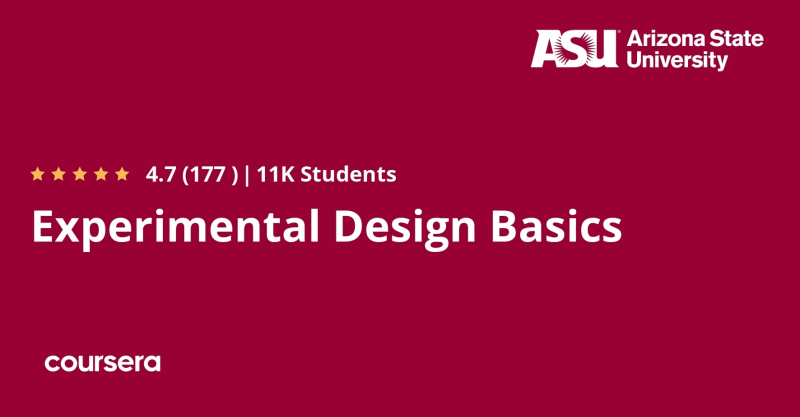
coursera.org 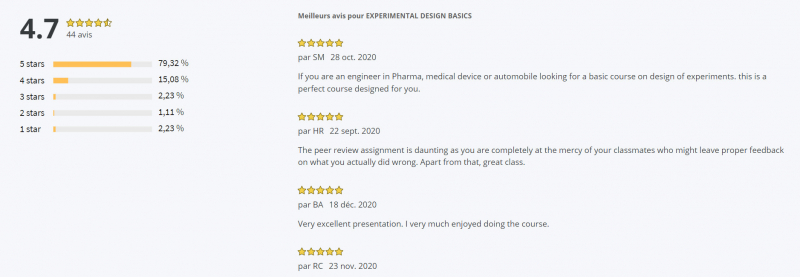
coursera.org -
Another best online experimental design course you should learn is Design of experiments specialization. In this course, you will learn modern experimental strategies, including factorial and fractional factorial experimental designs, designs for screening many factors, designs for optimization experiments, and designs for complex experiments such as those with hard-to-change factors and unusual responses. There is thorough coverage of modern data analysis techniques for experimental design, including software. Applications include electronics and semiconductors, automotive and aerospace, chemical and process industries, pharmaceutical and bio-pharm, medical devices, and many others.
Participants will complete a project that is typically based on their own work environment and can use this to effectively demonstrate the application of experimental design methodology. The structure of the course and the step-by-step process taught in the course is designed to ensure participant success.You will learn:
- Plan, design, and conduct experiments efficiently and effectively, and analyze the resulting data to obtain valid objective conclusions.
- Use response surface methods for system optimization as a follow-up to successful screening.
- Use experimental design tools for computer experiments, both deterministic and stochastic computer models.
- Use software tools to create custom designs based on optimal design methodology for situations where standard designs are not easily applicable.
This course offers:
- Flexible deadlines: Reset deadlines based on your availability.
- Get a Certificate when you complete
- 100% online
- Beginner level
- Approximately 4 months to complete
- Subtitles: English, Arabic, French, Portuguese (European), Italian, Vietnamese, German, Russian, Spanish
Participants: 6,973
Enroll here: https://www.coursera.org/specializations/design-experiments
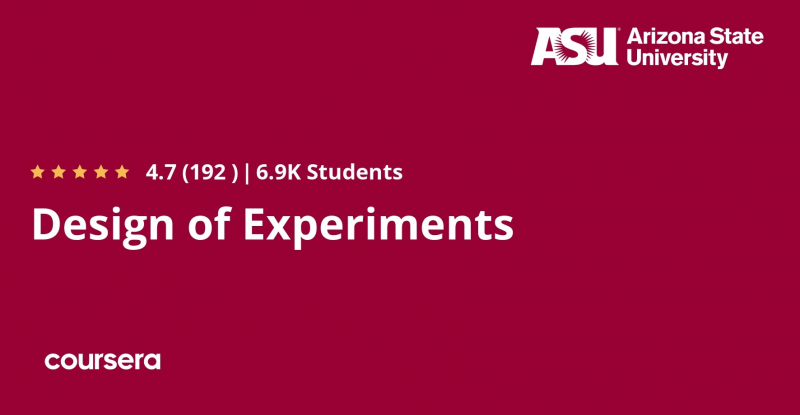
coursera.org 
coursera.org -
Introduction to Design of Experiments (Statistics) is also one of the best online experimental design courses. This course will teach you how to use experiments to gain maximum knowledge at a minimum cost. For processes of any kind that have measurable inputs and outputs, Design of Experiments (DOE) methods guide you in the optimum selection of inputs for experiments, and in the analysis of results. Full factorial, as well as fractional factorial designs, are covered.
All six-sigma practitioners, scientists, engineers, and technicians are interested in performing experiments that maximize process knowledge with minimal resources. Managers responsible for delivering products “on time” and “on budget” will also benefit from this course by learning what their employees should be doing. This course will stress the application of DOE rather than statistical theory. While the design of experiments has been very successfully applied in research and development, that is not the only application. The techniques presented also apply to manufacturing, quality control, and even marketing. At the conclusion of this course, you will be familiar with the foundations of experimental design. You will learn about interactions, coding, and randomization, how to choose appropriate designs, and how to conduct experiments and analyze your results.
By the end of this course, you will be able to:
- Explain the fundamental concepts of DOE, and why it is used
- Calculate treatment effects
- Produce plots from the results of experiments
- Specify fractional and full factorial designs
- Specify specialized designs, e.g. Taguchi, Box-Wilson, others
- Use Excel-based software to design experiments and analyze data
This course offers:
- Flexible deadlines: Reset deadlines based on your availability.
- Get a Certificate when you complete
- 100% online
- Introductory/Intermediate Level
- Approximately 4 weeks to complete
- Subtitles: English
- Expert Instructors
- Teacher Assistant Support
- Tuition-Back Guarantee
Participants: 3,066
Enroll here: https://www.statistics.com/courses/introduction-to-design-of-experiments/
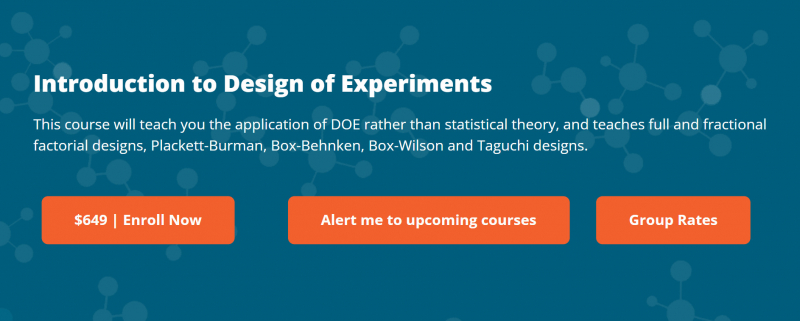
statistics.com 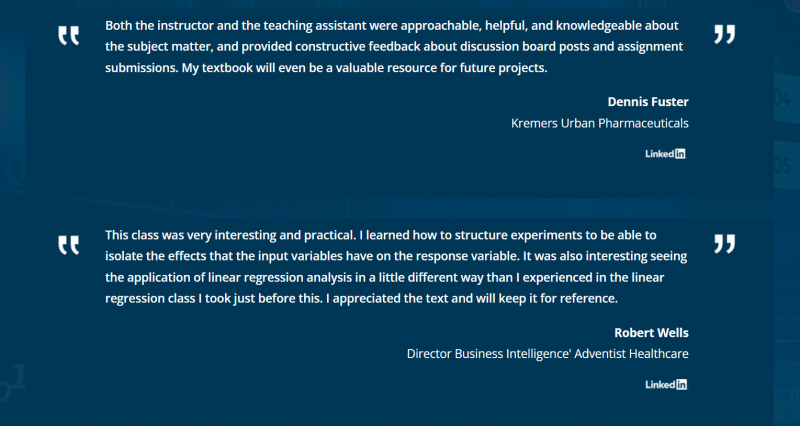
statistics.com -
In this Design of Experiments online course, you will learn the Design of Experiments or DOE. This design technique, which can be applied in several different methods, takes the results from a few carefully designed experiments and uses those results to create equations that explain how the product, process, or system works. By the end of the course, you will know what the keys to a successful DOE analysis are, and you will be able to conduct a Full Factorial DOE and a Fractional Factorial DOE. If you are a member or leader of an analysis team using a methodology such as Lean Six Sigma, this technique will be a significant aid when your problem resolution requires a major change to your systems.
In addition to covering experimental design approaches and methodologies, you will learn to use the popular statistical analysis application Minitab to conduct your DOE and apply your results. The design of experiments technique is incredibly powerful when working with new products, new technologies, or when migrating an existing technology into a new application. It is also very helpful for identifying the critical few parameters that will drive the performance of the product, process, or system. When you are in a discovery mode of analysis, this technique provides a path to important insights.This course offers:
- Flexible deadlines: Reset deadlines based on your availability.
- Get a Certificate when you complete
- 100% online
- Beginner level
- Approximately 2 hours to complete
- This course is part of the Lean Six Sigma Black Belt program
- Subtitles: English
Participants: 1,644
Enroll here: https://www.goskills.com/Course/Design-Experiments
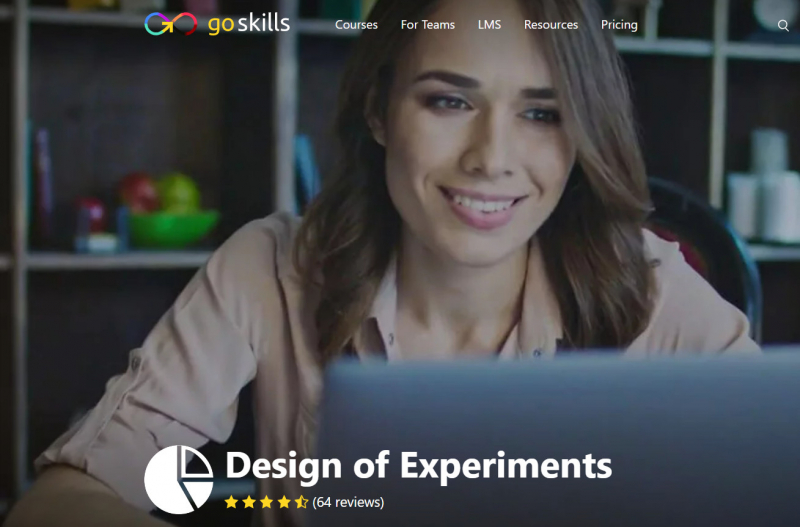
goskills.com 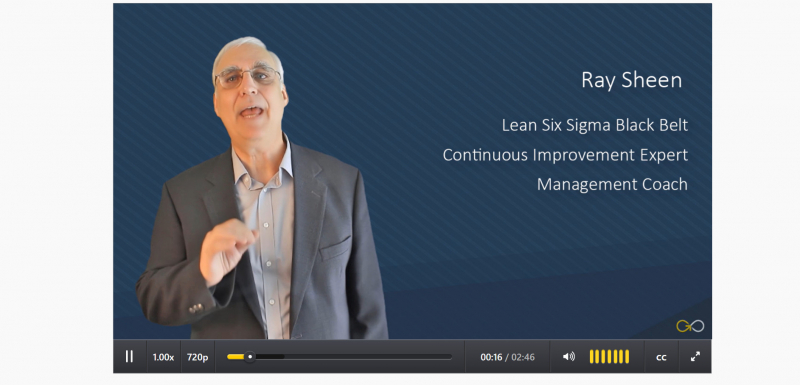
goskills.com -
ANOVA and Experimental Design is among the best online experimental design courses you should learn. This course will introduce students to the study of the analysis of variance (ANOVA), analysis of covariance (ANCOVA), and experimental design. ANOVA and ANCOVA, presented as a type of linear regression model, will provide the mathematical basis for designing experiments for data science applications. Emphasis will be placed on important design-related concepts, such as randomization, blocking, factorial design, and causality. Some attention will also be given to ethical issues raised in experimentation.
ANOVA and Experimental Design course can be taken for academic credit as part of CU Boulder’s Master of Science in Data Science (MS-DS) degree offered on the Coursera platform. The MS-DS is an interdisciplinary degree that brings together faculty from CU Boulder’s departments of Applied Mathematics, Computer Science, Information Science, and others. With performance-based admissions and no application process, the MS-DS is ideal for individuals with a broad range of undergraduate education and/or professional experience in computer science, information science, mathematics, and statistics.
This course offers:
- Flexible deadlines: Reset deadlines based on your availability.
- Get a Certificate when you complete
- 100% online
- Beginner level
- Course 2 of 3 in the Statistical Modeling for Data Science Applications Specialization
- Approximately 40 hours to complete
- Subtitles: English
Participants: 1,300
Enroll here: https://www.coursera.org/learn/anova-and-experimental-design
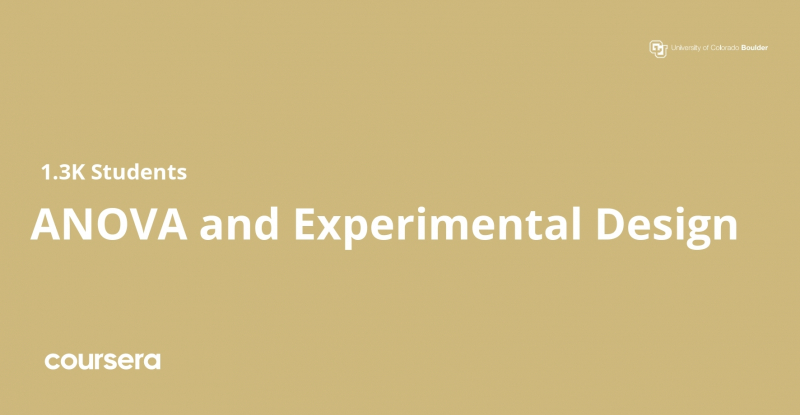
coursera.org 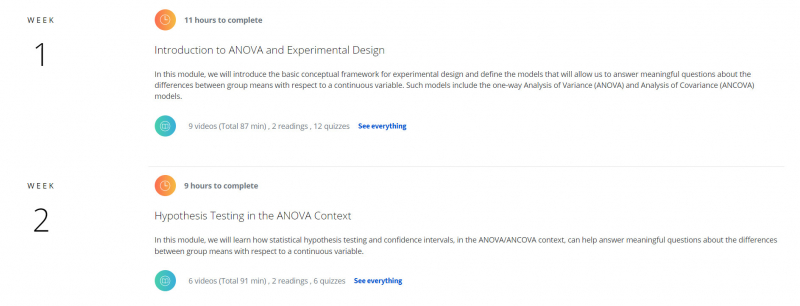
Course syllabus (coursera.org) -
Design of Experiments by the Pennsylvania State University is one of the best online experimental design courses. In this course, the lessons are offered in text format, accompanied by a series of homework exercises. Students should already feel comfortable using SAS at a basic level, be quick learners of software packages, or be able to figure out how to do the required analyses in another package of their choice. Students who have no experience with programming or are anxious about being able to manipulate software code are strongly encouraged to take the one-credit courses in SAS in order to establish this foundation before taking courses that rely on this software. SAS will be supported and sample programs will be supplied but you will be required to do some programming on your own.
This course may require you to take exams using certain proctoring software that uses your computer’s webcam or other technology to monitor and/or record your activity during exams. In this course, you will be worked with randomized and comparative contexts for the experiments. Implement designs such as confounding, blocking, Latin square, and more. You will also understand multiple other models and methods geared towards doing the experiment process a success.
By the end of this course, you will be able to:
- Understanding basic design principles
- Working in simple comparative experimental contexts
- Working with single factors or one-way ANOVA in completely randomized experimental design contexts
- Implementing randomized blocks, Latin square designs, and extensions of these
- Understanding factorial design contexts
This course offers:
- Flexible deadlines: Reset deadlines based on your availability.
- Get a Certificate when you complete
- 100% online
- Beginner level
- Approximately 15 chapters to complete
- Subtitles: English
Participants: 1,021
Enroll here: https://online.stat.psu.edu/statprogram/stat503
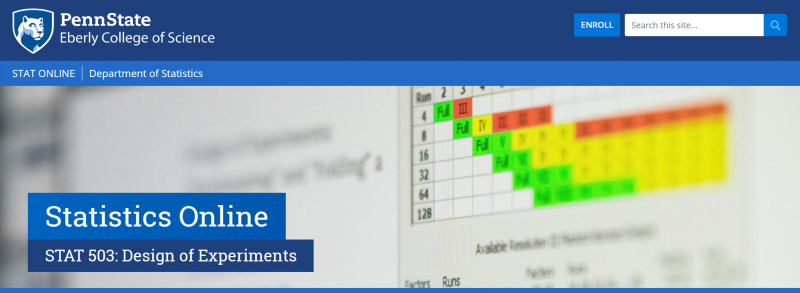
online.stat.psu.edu 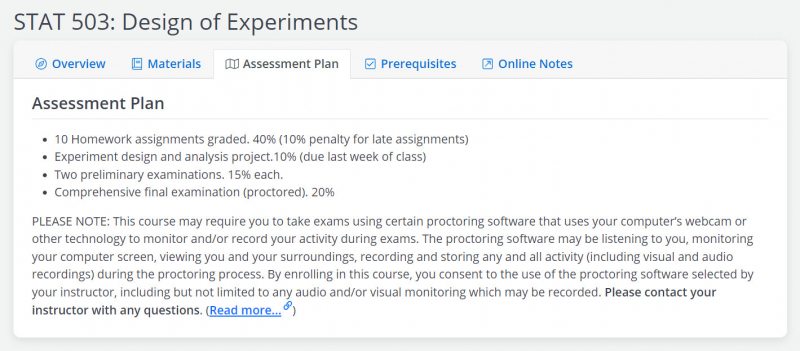
online.stat.psu.edu -
Experimentation plays an important role in science, technology, product design and formulation, commercialization, and process improvement. A well-designed experiment is essential once the results and conclusions that can be drawn from the experiment depend on the way the data is collected. This course will cover the basic concepts behind the Response Surface Methodology and Experimental Designs for maximizing or minimizing response variables.
Design of Experiments for Optimization course starts with a basic introduction to linear regression models and how to build regression models to fit experimental data and check the model adequacy. The next section covers experimental designs for linear models and the use of central points to check the model's linearity (lack-of-fit). By the end of the section, you will be using linear models to fit experiments with inaccurate levels in the design factors and missing observations. The whole learning process is illustrated with real examples from researchers in the industry and in the academy.
This course offers:
- Flexible deadlines: Reset deadlines based on your availability.
- Get a Certificate when you complete
- 100% online
- Intermediate level
- Approximately 1 hour to complete
- Subtitles: English
Participants: 550
Enroll here: https://www.udemy.com/course/design-of-experiments-for-optimisation/
udemy.com 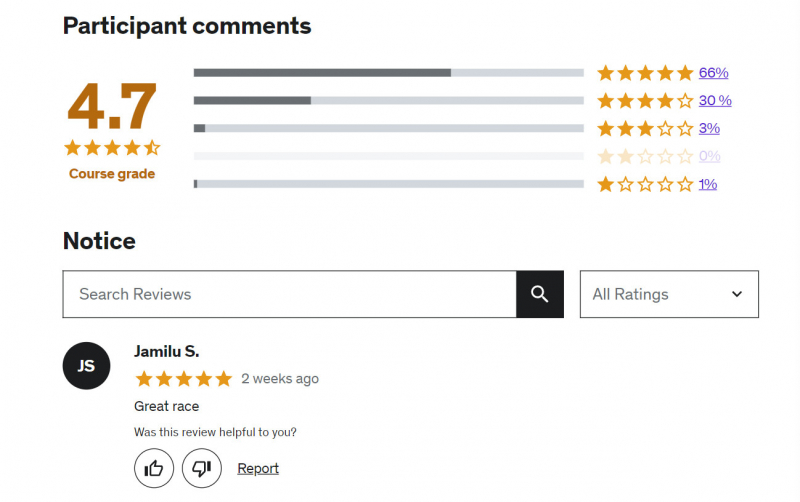
udemy.com -
The first best online experimental design course you should know is Experimental Design for Data Analysis. This course covers conceptual and practical aspects of building and evaluating machine learning models in a way that uses data judiciously, while also accounting for considerations such as ordering and relationships within data and other biases. Providing crisp, actionable points of view to senior executives is becoming an increasingly important role of data scientists and data professionals these days. Now, a point-of-view must represent a hypothesis, ideally backed by data.
In this course, Experimental Design for Data Analysis, you will gain the ability to construct such hypotheses from data and use rigorous frameworks to test whether they hold true. First, you will learn how inferential statistics and hypothesis testing form the basis of data modeling and machine learning. Next, you will discover how the process of building machine learning models is akin to that of designing an experiment and how training and validation techniques help rigorously evaluate the results of such experiments. Then, you will round out the course by studying various forms of cross-validation, including both singular and iterative techniques to cope with independent, identically distributed data and grouped data. Finally, you will also learn how you can refine your models using these techniques with hyperparameter tuning.
This course offers:
- Flexible deadlines: Reset deadlines based on your availability.
- Get a Certificate when you complete
- 100% online
- Beginner level
- Approximately 3 hours to complete
- Subtitles: English
Participants: 353
Enroll here: https://www.pluralsight.com/courses/experimental-design-data-analysis
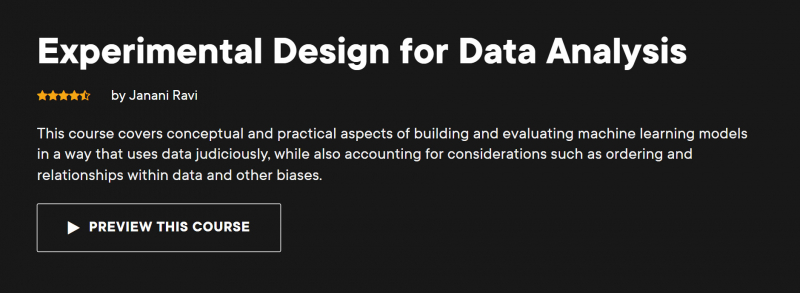
app.pluralsight.com 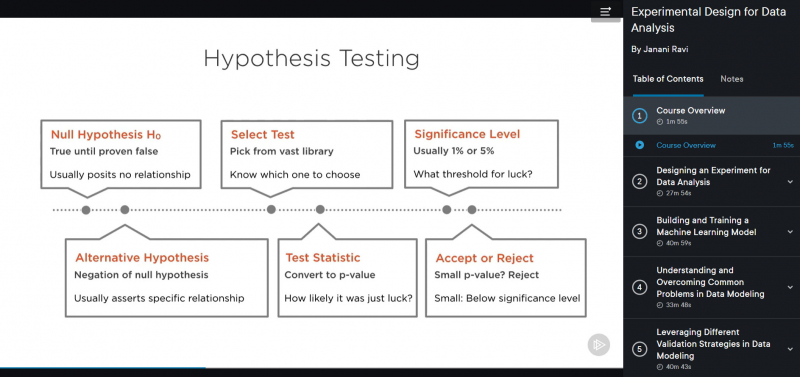
app.pluralsight.com -
Another best online experimental design course is Design of Experiments (DOE). It is a statistical tool that helps you to design any experiment properly toward the right conclusions. In this beginner online course, you learn by examples and you will know first what is the design of the experiment and the aim behind it, then you will go deeper thus learning how to plan, execute and analyze any experiment properly using this powerful tool.
You will also encounter both types of factorial designs here (Full Factorial Design and Fractional Factorial Design). This tutorial will allow any newbie to fully learn how to plan, execute and analyze any experiment properly, thus making the right conclusions. This tool is mandatory for any scientist or engineer, especially those working within the research and development sector, and is also essential for those who practice and work with six sigma.
This course offers:
- Flexible deadlines: Reset deadlines based on your availability.
- Get a Certificate when you complete
- 100% online
- Beginner level
- Approximately 1 hour to complete
- Subtitles: English
Participants: 319
Enroll here: https://www.udemy.com/course/design-of-experiments-experimental-design-doe/

udemy.com 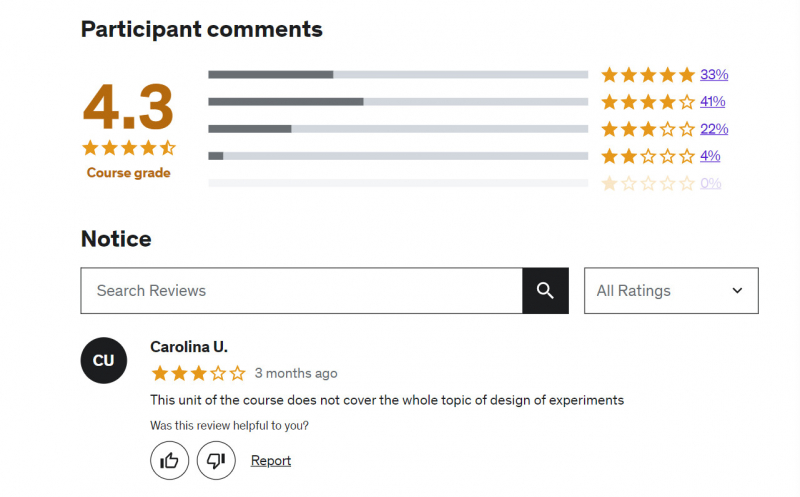
udemy.com











